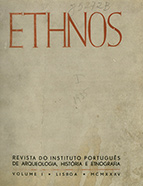

................................
Noteworthy among the articles are those addressing archaeological, historical, and ethnographic themes. Predominantly aligned with the cultural-historical archaeological school, most of the content focuses on systematically cataloguing finds from expeditions, primarily conducted under the auspices of the Museu Etnológico . These studies aimed to define the ethnic and cultural identities of the populations associated with the analysed material culture. This approach reflected Manuel Heleno's belief that Portuguese nationality had been definitively established "since the time of the polished stone” (Carlos Valentim, Idem ). Even when discussing specific subjects such as megalithism or the Roman period, the methodology was rigorously detailed, with precise descriptions of excavated artefacts. However, a nationalist narrative underpinning the origins of Portuguese identity was consistently present. This school of thought also drew on the legacy of Leite de Vasconcelos, particularly his work Religiões da Lusitânia [Religions of Lusitania], which sought to establish the worldview of the Lusitanians as a cornerstone of Portuguese identity (João Afonso Corte-Real, “Lusitanidade de Évora”, Ethnos , vol. 7, 1970, pp. 215-244). This perspective reflects a distinctly 19th-century legacy, influenced by social Darwinism and the quest for a "pure" national authenticity, powerful tools for legitimising emerging nation-states. Within the historical context of the Estado Novo regime, which prioritised glorifying the nation's achievements, the exploration of the nation's supposed roots—presented through technically impeccable and scientifically credible analyses—served the political goals of the journal's principal promoter and his associates, many of whom were members of the IAHE. The final issue, published in 1979 (after the 25 April Revolution), marked a departure from the nationalist framework. It included articles on Bell Beaker culture, imported ceramics, and a typological essay with a distinct anthropological foundation. These contributions broke away from the ethnic narratives of earlier editions, offering instead straightforward interpretations of past societies based on material culture. This shift reflected an epistemological grounding in cultural evolutionism and anthropology, signalling a processualist approach.
This work is financed by national funds through FCT - Foundation for Science and Technology, I.P, in the scope of the projects UIDB/04311/2020 and UIDP/04311/2020.
